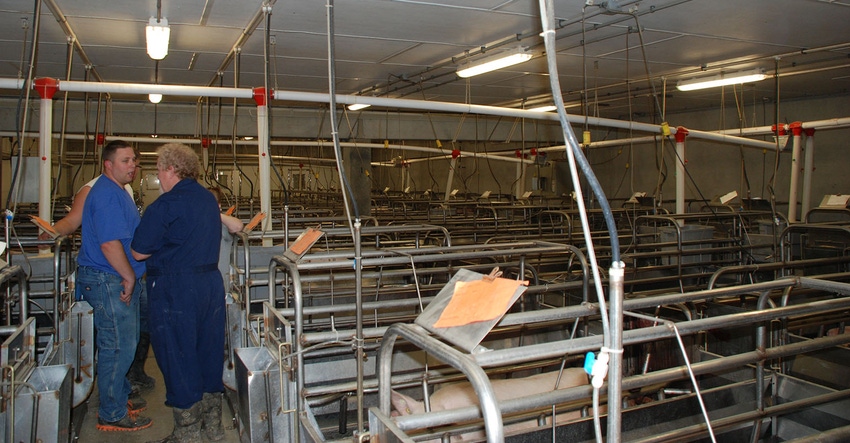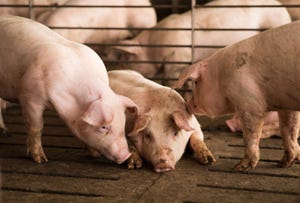Investing in new employees critical to success
Taking a systematic approach to training and remaining humble can help reduce turnover and allow you to recuperate the initial investment in employee training many times over.
September 15, 2017

By Neal Benjamin, Carthage Veterinary Service
Bringing new employees up to speed quickly and giving them tools they need to succeed long term is critical to the longevity of any business especially hog farming. Unfortunately hog farmers struggle to find quality skilled workers and despite offering competitive wages turnover remains a problem across the industry. While many might think that this is a uniquely American problem, hog farmers in Europe, China and Japan report similar challenges. Raising pigs is hard (and they tell me smelly!) work and we compete with other sectors to retain quality employees.
When training a new employee it is critical that you take prior experience into account. Due to the urbanization of the U.S. population during the 20th century it is likely that many, if not most, of our new hires will have no prior hog experience and may not have worked in agriculture before. Expecting someone from outside the industry to succeed without intensive training will lead to frustration and failure.
On Day 1 remember that a new hire is getting used to new smells and sounds (pigs are loud!). Due to the mechanization of agriculture we have become a sedentary nation and for someone unaccustomed to farm work it will take a few weeks for their body to adjust to standing for an entire workday and using muscles to earn their daily bread. Those of us lucky enough to grow up on a farm love to talk about the values we learned working from an early age. A dose of humility is in order: a lot of people from other backgrounds also have good work ethics. Also remember that a lot of things that we think about being “common sense” only seem obvious because after having done them many times.
Working with pigs (as with farming in general) takes many skills and developing an intuitive “pig sense” takes months not days.
Ideally we would bring on new employees to be trained by their predecessors prior to their departure from the farm, while the farm is still fully staffed. In the real world new hires often walk into an understaffed farm with a laundry list of tasks needing to be completed yesterday. Confronted with this stressful situation it is tempting to stick the new employee on the more thankless or supposedly lower-skill jobs: collecting dead, power washing or vaccinating. While new hires need to pull their weight from Day 1 it is essential to avoid giving them the hardest jobs with little supervision or support. Many justify such actions as an attempt to “see if they are cut out to work with pigs,” but this can quickly lead to feelings of resentment or feel like hazing the new guy.
Also while we may think about power washing, etc., as low-skill jobs, doing them efficiently and quickly takes practice and there are a lot of little tricks which are not immediately evident to someone not raised around hog farming. I have spoken to several employees who ended up becoming successful farm managers who initially thought about quitting after getting overwhelmed on the first day. If we can get the employee to stick around for the first two weeks many will adapt to the new smells and physical demands of the job and realize what we already know: how rewarding hog farming really is.
Getting down to the specifics of training I believe it is important to set clear expectations from Day 1. If a farm is lucky enough to have detailed standard operating procedures with pictures, this is an excellent place to start. Unfortunately many smaller farms will not have this luxury. I like to write out expectations/instructions and then discuss them with the employee so that they have something to reference after you’ve moved on to the other umpteen items on your to-do list for the day. Better yet, give them a pen and paper and have them take their own notes while you go over work plans together. Remember that some employees may not have been spoiled by very much formal education and despite being very intelligent may struggle with reading or even recognizing numbers. Luckily such employees have often learned to compensate and can often remember a given task if one simply shows them how to do it. It is important to remember that (most) employees will want to please and will feel pressure to agree if asked if they understand a given set of instructions. Instead of asking if an employee understands (hint they will usually say yes!) ask them to repeat back your instructions or explain them to you.
When dealing with a language barrier fall back on nonverbal communication such as facial expressions and body language. Miming out instructions paired with a smile and good attitude can really go a long way toward ensuring comprehension. Sometimes another employee can help translate key information. If no one else on the farm speaks the same language as a new employee it might be wise to have a friend help translate for the first few hours of orientation/training on Day 1.
As you progress with training a new employee consider the quote from the ancient Chinese philosopher Xunxi: “Not having heard something is not as good as having heard it; having heard it is not as good as having seen it; having seen it is not as good as knowing it; knowing it is not as good as putting it into practice.”
After you’ve explained how to do a given task you ought to show them how it is done. Ideally you can pair an inexperienced employee with an experienced one and let them observe an experienced worker do their job. Some of the farm managers I work with have new employees spend their entire first day observing. They reckon this initial investment of seemingly unproductive time will allow them to see how to do the job efficiently and give them realistic expectations about how long a given task should take to accomplish.
As an employee begins to work solo it is important to take a step back and observe, offering encouragement and, when necessary, helpful criticism. I find it helpful to couch criticism with reassurance and affirmation while avoiding personal attacks. For example: “I’m really glad you are on our team. You seem to be struggling with ‘Task X.’ It is very important that we are on the same page, etc.” Where a new hire fails to accomplish a task in an efficient way try to avoid the urge to assume negative character attributes or moralizing “they’re lazy” or “kids these days just do not have a work ethic.”
Contrary to what some people outside the industry may think, farming is a fast-paced job and new hires will not be used to how quickly they will be expected to accomplish their work for the day. Most people want to do a good job, but when they fail to do so they may not understand the expectations or may need help learning the tricks needed to accomplish the job faster.
If the employee has demonstrated that they know how to do the job and are still failing to get it done, then this is the time to go over expectations. Even here avoiding personal attacks will help prevent reflexive defensiveness and allow you to focus on the deficiency. “I value your help here and I think I appreciate your integrity as a worker. We are relying on you to accomplish ‘Task X’ and I’ve noticed you are having trouble getting it done. Let me know how I can help. I value your help but if you are unwilling to do your job maybe this job is not a good fit for you.”
With less and less of the population growing up on farms it is becoming increasingly necessary to hire more people from outside the industry to staff our farms. While many of these new hires have the potential to make great long-term employees we will continue to face the challenge of managing people with little experience. Taking a systematic approach to training and remaining humble can help reduce turnover and allow you to recuperate the initial investment in employee training many times over.
You May Also Like



